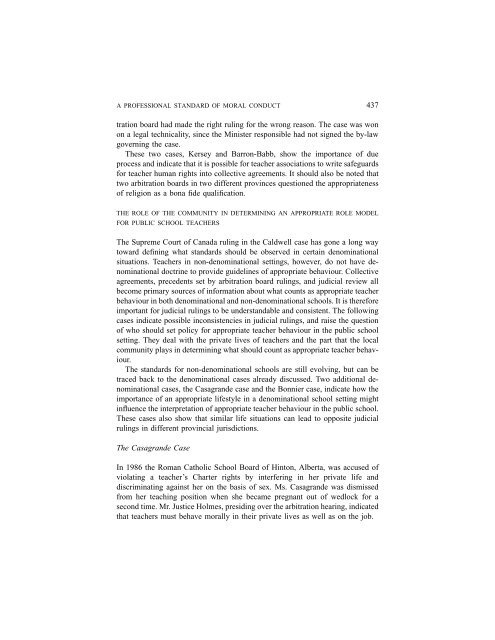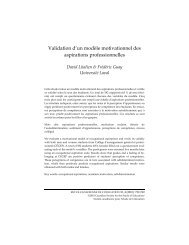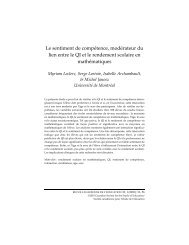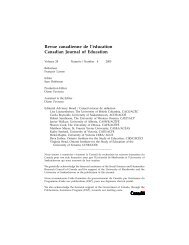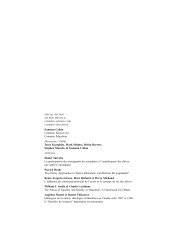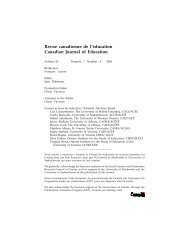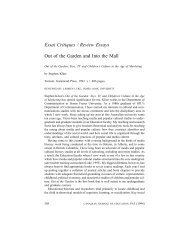Mireille Falardeau et Michel Loranger Le choix de stratégies ... - CSSE
Mireille Falardeau et Michel Loranger Le choix de stratégies ... - CSSE
Mireille Falardeau et Michel Loranger Le choix de stratégies ... - CSSE
You also want an ePaper? Increase the reach of your titles
YUMPU automatically turns print PDFs into web optimized ePapers that Google loves.
A PROFESSIONAL STANDARD OF MORAL CONDUCT 437<br />
tration board had ma<strong>de</strong> the right ruling for the wrong reason. The case was won<br />
on a legal technicality, since the Minister responsible had not signed the by-law<br />
governing the case.<br />
These two cases, Kersey and Barron-Babb, show the importance of due<br />
process and indicate that it is possible for teacher associations to write safeguards<br />
for teacher human rights into collective agreements. It should also be noted that<br />
two arbitration boards in two different provinces questioned the appropriateness<br />
of religion as a bona fi<strong>de</strong> qualification.<br />
THE ROLE OF THE COMMUNITY IN DETERMINING AN APPROPRIATE ROLE MODEL<br />
FOR PUBLIC SCHOOL TEACHERS<br />
The Supreme Court of Canada ruling in the Caldwell case has gone a long way<br />
toward <strong>de</strong>fining what standards should be observed in certain <strong>de</strong>nominational<br />
situations. Teachers in non-<strong>de</strong>nominational s<strong>et</strong>tings, however, do not have <strong>de</strong>nominational<br />
doctrine to provi<strong>de</strong> gui<strong>de</strong>lines of appropriate behaviour. Collective<br />
agreements, prece<strong>de</strong>nts s<strong>et</strong> by arbitration board rulings, and judicial review all<br />
become primary sources of information about what counts as appropriate teacher<br />
behaviour in both <strong>de</strong>nominational and non-<strong>de</strong>nominational schools. It is therefore<br />
important for judicial rulings to be un<strong>de</strong>rstandable and consistent. The following<br />
cases indicate possible inconsistencies in judicial rulings, and raise the question<br />
of who should s<strong>et</strong> policy for appropriate teacher behaviour in the public school<br />
s<strong>et</strong>ting. They <strong>de</strong>al with the private lives of teachers and the part that the local<br />
community plays in d<strong>et</strong>ermining what should count as appropriate teacher behaviour.<br />
The standards for non-<strong>de</strong>nominational schools are still evolving, but can be<br />
traced back to the <strong>de</strong>nominational cases already discussed. Two additional <strong>de</strong>nominational<br />
cases, the Casagran<strong>de</strong> case and the Bonnier case, indicate how the<br />
importance of an appropriate lifestyle in a <strong>de</strong>nominational school s<strong>et</strong>ting might<br />
influence the interpr<strong>et</strong>ation of appropriate teacher behaviour in the public school.<br />
These cases also show that similar life situations can lead to opposite judicial<br />
rulings in different provincial jurisdictions.<br />
The Casagran<strong>de</strong> Case<br />
In 1986 the Roman Catholic School Board of Hinton, Alberta, was accused of<br />
violating a teacher’s Charter rights by interfering in her private life and<br />
discriminating against her on the basis of sex. Ms. Casagran<strong>de</strong> was dismissed<br />
from her teaching position when she became pregnant out of wedlock for a<br />
second time. Mr. Justice Holmes, presiding over the arbitration hearing, indicated<br />
that teachers must behave morally in their private lives as well as on the job.


